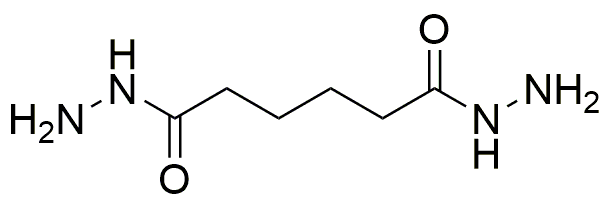Adipic dihydrazide is widely utilized in research focused on:
- Polymer Production: It serves as a key intermediate in the synthesis of polyamide resins, which are used in the manufacturing of durable plastics and fibers, enhancing their mechanical properties.
- Pharmaceutical Applications: This compound is important in drug formulation, particularly in creating hydrazone derivatives that can improve drug stability and bioavailability.
- Bioconjugation: Adipic dihydrazide is employed in bioconjugation techniques, allowing researchers to attach biomolecules to surfaces or other molecules, which is crucial in developing targeted drug delivery systems.
- Coating and Adhesive Formulations: It is used in the formulation of coatings and adhesives, providing improved adhesion and durability, making it ideal for industrial applications.
- Research in Material Science: The compound is a subject of study for developing new materials with specific properties, such as increased thermal stability and resistance to environmental degradation.
General Information
Properties
Safety and Regulations
Applications
Adipic dihydrazide is widely utilized in research focused on:
- Polymer Production: It serves as a key intermediate in the synthesis of polyamide resins, which are used in the manufacturing of durable plastics and fibers, enhancing their mechanical properties.
- Pharmaceutical Applications: This compound is important in drug formulation, particularly in creating hydrazone derivatives that can improve drug stability and bioavailability.
- Bioconjugation: Adipic dihydrazide is employed in bioconjugation techniques, allowing researchers to attach biomolecules to surfaces or other molecules, which is crucial in developing targeted drug delivery systems.
- Coating and Adhesive Formulations: It is used in the formulation of coatings and adhesives, providing improved adhesion and durability, making it ideal for industrial applications.
- Research in Material Science: The compound is a subject of study for developing new materials with specific properties, such as increased thermal stability and resistance to environmental degradation.
Documents
Safety Data Sheets (SDS)
The SDS provides comprehensive safety information on handling, storage, and disposal of the product.
Product Specification (PS)
The PS provides a comprehensive breakdown of the product’s properties, including chemical composition, physical state, purity, and storage requirements. It also details acceptable quality ranges and the product's intended applications.
Certificates of Analysis (COA)
Search for Certificates of Analysis (COA) by entering the products Lot Number. Lot and Batch Numbers can be found on a product’s label following the words ‘Lot’ or ‘Batch’.
Numéro de catalogue
Numéro de lot/série
Certificates Of Origin (COO)
This COO confirms the country where the product was manufactured, and also details the materials and components used in it and whether it is derived from natural, synthetic, or other specific sources. This certificate may be required for customs, trade, and regulatory compliance.
Numéro de catalogue
Numéro de lot/série
Safety Data Sheets (SDS)
The SDS provides comprehensive safety information on handling, storage, and disposal of the product.
DownloadProduct Specification (PS)
The PS provides a comprehensive breakdown of the product’s properties, including chemical composition, physical state, purity, and storage requirements. It also details acceptable quality ranges and the product's intended applications.
DownloadCertificates of Analysis (COA)
Search for Certificates of Analysis (COA) by entering the products Lot Number. Lot and Batch Numbers can be found on a product’s label following the words ‘Lot’ or ‘Batch’.
Numéro de catalogue
Numéro de lot/série
Certificates Of Origin (COO)
This COO confirms the country where the product was manufactured, and also details the materials and components used in it and whether it is derived from natural, synthetic, or other specific sources. This certificate may be required for customs, trade, and regulatory compliance.

